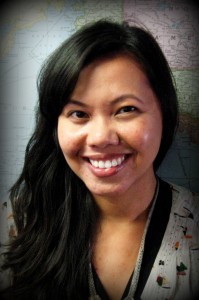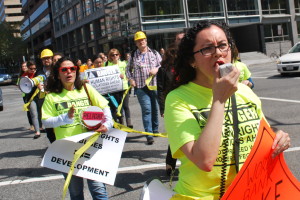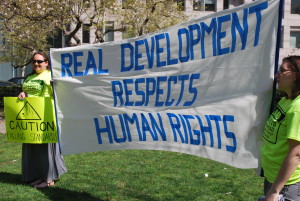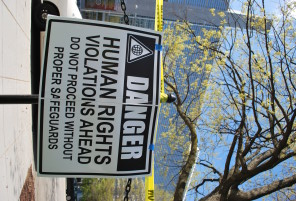
We are in the final stretch.
As you may recall, CIEL has been working since 2012 to ensure that the revision and update of the World Bank’s policies that safeguard communities and the environment are stronger and better reflect international law. On August 4, 2015, the World Bank kicked off the much-anticipated third and final consultation phase of its Safeguard Review by publicly releasing the Revised Draft of the Environmental and Social Framework. This Framework includes the Bank’s policies to ensure that its projects “do no harm” to the environment and communities.
Leading up to this moment, CIEL spearheaded advocacy efforts to ensure meaningful, worldwide, in-person participation by communities that may be impacted by World Bank projects. To us, it is obvious that the voices of communities should be the first ones to be heard when decisions about development could have direct impacts on their lives and livelihoods. But, the Bank was contemplating a different approach – one reliant largely on online consultations that would be completed in as little as two months.
 So we responded. In collaboration with 100 organizations globally, we provided recommendations to the Bank and government representatives around the world, including the World Bank Executive Board – the governing body of the Bank that has representatives from 188 countries.
So we responded. In collaboration with 100 organizations globally, we provided recommendations to the Bank and government representatives around the world, including the World Bank Executive Board – the governing body of the Bank that has representatives from 188 countries.
As a result of this mounting pressure, the Bank decided against a strictly online consultation. While the details are not fully available, the Bank has agreed to hold consultations in at least 30 countries. The final consultations will focus not only on implementation (as originally contemplated), but also on substantive issues that “require further attention,” as the Bank puts it. When the Executive Board met in June and July, they requested that the Bank provide a list of questions to guide what this means.
 There are over 50 issues on that list, including the contentious issue of human rights and the application of the Indigenous Peoples policy in “complex political and cultural contexts.”
There are over 50 issues on that list, including the contentious issue of human rights and the application of the Indigenous Peoples policy in “complex political and cultural contexts.”
Another highly contested issue is whether the policies will allow the use of a country’s laws and regulations in lieu of the Bank’s suite of environmental and social policies. Critical to this issue is the criteria that will be used to decide whether or not to rely on a country’s national legal and regulatory framework. Equally important is the assessment and treatment of a country’s track record of implementation, as well as the enabling environment for critical voices. For instance, what will the Bank do when a country, such as Cambodia, has laws on the book, but the lacks the political will and capacity to implement its own legal framework in a non-discriminatory manner?
 As civil society groups have noted, there is a risk that relying on national laws instead of Bank policies could allow the Bank or the borrower to avoid responsibility for the human rights and environmental risks borne by communities. The revised Environmental and Social Framework will have to be approved by the World Bank Executive Board and that decision may not happen until next year. That means we still have plenty of debates, discussions, and moments to continue pushing the Bank to do better, because the Bank can and should do better. CIEL is committed to seeing this process through because this piece of advocacy is one of the most important ways that we can protect the rights of communities from harmful development projects around the world.
As civil society groups have noted, there is a risk that relying on national laws instead of Bank policies could allow the Bank or the borrower to avoid responsibility for the human rights and environmental risks borne by communities. The revised Environmental and Social Framework will have to be approved by the World Bank Executive Board and that decision may not happen until next year. That means we still have plenty of debates, discussions, and moments to continue pushing the Bank to do better, because the Bank can and should do better. CIEL is committed to seeing this process through because this piece of advocacy is one of the most important ways that we can protect the rights of communities from harmful development projects around the world.
Originally posted on August 15, 2015.
